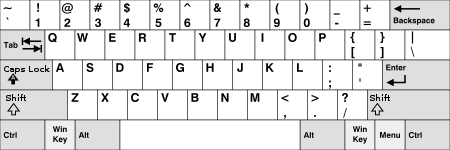Caps Lock

The caps lock is a key on a computer keyboard. Pressing it will set a keyboard mode in which typed letters are capitalized by default and (on some computers) in lower case when the shift key is pressed; the keyboard remains in this mode until caps lock is pressed again.
Cultural significance
The original utility of the key allowed the typing of all caps where appropriate, such as titles at the top of a page, without requiring the typist to manually keep the shift key depressed as long as needed. However, with the advent of modern styling such as small caps and section headers entered only once, this function has depreciated in usefulness.
On Internet chat systems, forums and Usenet, typing a sentence in all capitals is considered rude, the large letters akin to shouting or yelling within the social context. On a more practical level, text written in all capital letters, a result of engaging the caps lock, may be difficult to read.[1] The 'Caps Lock Theory', is often referred to in Internet chat forums and states that there is an inverse relationship between a person's use of the caps lock and their knowledge of a particular subject. There are known groups of people whose Internet communities are based entirely around the use of the caps lock key. [citation needed]

Case sensitivity, a feature used in passwords to increase their security, can also conflict with caps lock. Many services and pages that utilize this feature warn the user up front to check the status of the caps lock function before entering a username and/or password. FAQ pages and other help guides also include this advice to reduce the incidence of complaints to support technicians for such a minor and easily-prevented issue. In Mac OS X, when caps lock is engaged at a login or authentication panel, a symbol for caps lock (⇪) warns of the state from within the password field.
In 2006, Pieter Hintjens began a campaign to remove the caps lock key from the standard keyboard layout. While the vast majority of manufacturers continue to produce keyboards which include a caps lock, some have removed it.[2] One Laptop Per Child computers, for example, do not have a Caps Lock key,[3], and the Colemak layout replaces it with Backspace.
On older keyboards, the Control key was located on the left of the keyboard, some people choose to remap the keys to exchange Caps Lock and Control.
Shift lock
In QWERTY keyboards, though the caps lock mode capitalizes letters, it does not affect other keys, such as numbers or punctuation, in the way that the shift key does. A version of caps lock that affects all keys as shift does exists on certain layouts such as the French AZERTY and those of some older computers, including the Commodore 64; this function is called shift lock. The origin of the function is found on mechanical typewriters, where the shift key causes the type apparatus to physically shift to produce capitals and secondary characters. To lock this mechanism in place, a special non-character key could be depressed along with shift. The mechanism would not unlock until after pressing a shift key or shift lock again. Some operating systems and window managers allow caps lock to be used for a similar function.
External links
- Wiki:CapsLockOff describes how to remap the caps lock key for other purposes.
- Disable Caps Lock using a registry file
- CAPSoff Official Website
- Caps Lock Day Website
References
- ^ Williams, Thomas R. (2000). "Guidelines for Designing and Evaluating the Display of Information on the Web". Technical Communication. 47 (3): 383–396.
- ^ "CapsOff.org". Retrieved 2006-09-27.
- ^ Don Marti (2006-10-27). "Doing it for the kids, man: Children's laptop inspires open source projects". Linux World. Retrieved 2007-07-23.
| Esc | F1 | F2 | F3 | F4 | F5 | F6 | F7 | F8 | F9 | F10 | F11 | F12 | PrtScn/ SysRq |
Scroll Lock |
Pause/ Break |
|||||||||
 |
Insert | Home | PgUp | Num Lock |
∕ | ∗ | − | |||||||||||||||||
| Delete | End | PgDn | 7 | 8 | 9 | + | ||||||||||||||||||
| 4 | 5 | 6 | ||||||||||||||||||||||
| ↑ | 1 | 2 | 3 | Enter | ||||||||||||||||||||
| ← | ↓ | → | 0 Ins |
. Del | ||||||||||||||||||||
